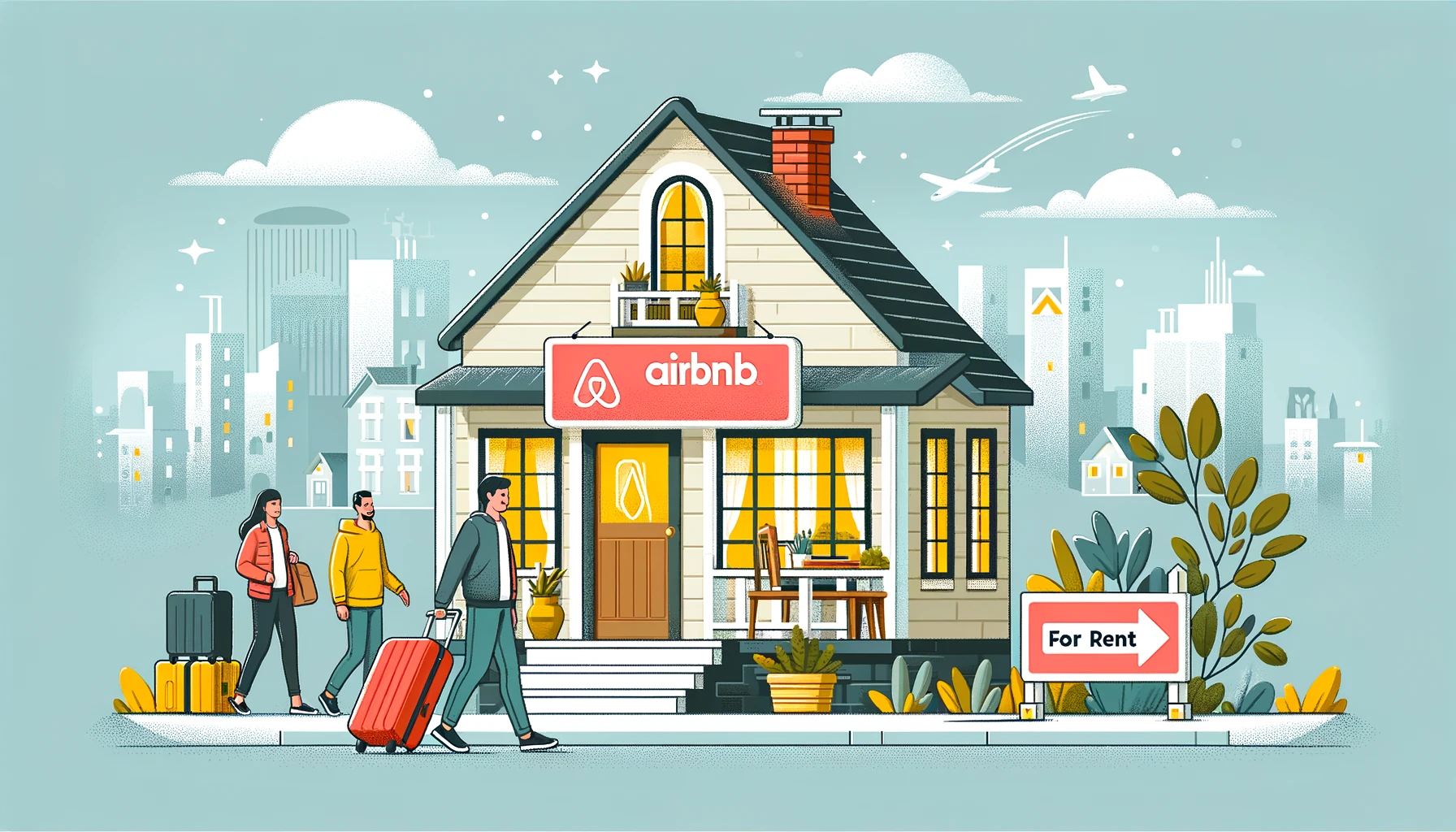Introduction to Airbnb vs Renting
Welcome to our comprehensive blog, “Maximizing Your Property’s Potential: Airbnb vs. Renting.” In today’s dynamic real estate market, property owners are constantly seeking innovative ways to optimize their investments. This guide is designed to delve deep into the world of property rentals, focusing on two popular options: Airbnb and renting.
Airbnb, a revolutionary platform, has transformed how people travel and stay in different locations. It offers a unique opportunity for property owners to monetize their spaces by hosting travelers from around the world. On the other hand, traditional renting, a time-tested method, involves leasing property to tenants for longer periods, providing a steady income stream and stability.
The choice between Airbnb and renting is not straightforward. Each option comes with its own set of benefits and challenges, and the decision can significantly impact your income potential and overall property management experience.
In this blog, we aim to provide a detailed comparison of Airbnb and traditional renting. From financial aspects to legal considerations, time commitments to flexibility, we’ll cover all the key factors you need to consider. Whether you’re a seasoned property owner or new to the world of real estate investment, this guide will equip you with the knowledge to make an informed decision that best suits your goals and lifestyle.
Understanding Airbnb

What is Airbnb? Airbnb began as a simple idea of renting out air mattresses in a living room. Today, it has evolved into a global phenomenon, offering unique accommodations in more than 190 countries. The platform connects property owners, known as ‘hosts,’ with guests looking for a place to stay. From spare bedrooms to entire houses, Airbnb provides a wide range of options.
The Concept and Growth of Airbnb Airbnb’s model is based on the sharing economy. It allows property owners to list their spaces, set their prices, and host guests at their convenience. The platform has seen exponential growth, not just in urban areas but also in rural and offbeat destinations, catering to a diverse range of traveler preferences.
How Does Airbnb Work for Property Owners? As an Airbnb host, you have the flexibility to decide when and how to rent your space. Here’s a brief overview of the process:
- Listing Your Property: Create a listing on the Airbnb platform, providing details and photos of your space.
- Pricing Strategy: Set a price per night, considering factors like location, amenities, and market demand.
- Managing Bookings: Use the platform to communicate with potential guests, manage bookings, and receive payments.
- Hosting Experience: Provide guests with a comfortable stay, which can include anything from basic accommodations to unique local experiences.
Advantages for Hosts Airbnb offers several advantages for property owners:
- Flexibility: Choose when to host and set your own house rules.
- Income Potential: Often, Airbnb can yield higher returns than traditional rentals, especially in high-demand locations.
- Community and Support: Gain access to a global community of hosts and robust support from Airbnb, including host protection insurance.
Hosting Responsibilities Being an Airbnb host also comes with responsibilities:
- Maintaining Standards: Ensuring your space meets cleanliness and safety standards.
- Active Involvement: Regularly updating your listing, communicating with guests, and managing the property.
- Navigating Regulations: Complying with local laws and regulations related to short-term rentals.
Understanding Traditional Renting

In contrast to the relatively new and dynamic world of Airbnb, traditional renting offers a more established and stable approach to property leasing. This section will explore the key aspects of traditional renting, shedding light on what it entails for property owners.
What is Traditional Renting? Traditional renting involves leasing your property to tenants for an extended period, typically ranging from six months to multiple years. This model is characterized by longer-term agreements, providing a consistent and predictable income stream.
The Dynamics of Being a Landlord As a traditional landlord, your role extends beyond just providing a space to live. It encompasses a range of responsibilities and interactions with tenants, including:
- Lease Agreements: Crafting and enforcing lease agreements that outline the terms, conditions, and duration of the rental.
- Tenant Screening: Conducting thorough background checks to ensure reliable and trustworthy tenants.
- Rent Collection: Regularly collecting rent, which can be a fixed monthly amount, and managing any late payments.
- Property Maintenance: Ensuring the property is habitable, addressing repairs and maintenance issues promptly.
- Legal Compliance: Abiding by local housing laws and regulations, including tenant rights and property standards.
Financial Aspects of Traditional Renting The financial model for traditional renting is straightforward but less dynamic than Airbnb. The income is usually fixed, based on the rental agreement, providing a steady cash flow. However, it’s less susceptible to fluctuations in tourist demand and seasonality.
Advantages of Traditional Renting
- Stability: Long-term leases provide a more predictable and stable income.
- Less Active Management: Once a tenant is in place, day-to-day management is typically less intensive compared to Airbnb hosting.
- Long-Term Tenant Relationships: Building a long-term relationship with tenants can lead to easier management and fewer turnover costs.
Challenges of Traditional Renting
- Limited Flexibility: The property is generally unavailable for personal use, and changing rental terms can be more challenging.
- Vacancy Risks: Unoccupied periods can lead to loss of income.
- Potential for Difficult Tenant Situations: Issues like late payments or property damage require active resolution.
Comparative Analysis: Airbnb vs. Renting
This section offers a side-by-side comparison of Airbnb vs renting, highlighting key factors that property owners should consider. We’ll discuss financial aspects, time and management requirements, legal considerations, and flexibility.
Financial Aspects
1. Potential Income
- Airbnb: Generally offers higher potential income per night, especially in popular tourist destinations or during peak seasons. Income can fluctuate based on demand, seasonality, and competition.
- Renting: Provides a steady, predictable income based on monthly rent. Less affected by seasonality but could be impacted by local rental market trends.
2. Fees and Expenses
- Airbnb: Hosts pay a service fee to Airbnb (typically around 3%). Additional expenses include cleaning, supplies, and more frequent maintenance.
- Traditional Renting: Expenses include property maintenance, management fees (if using a property manager), and potential real estate agent fees for tenant placement.
3. Taxes
- Both Airbnb and traditional renting are subject to income tax on earnings. However, tax regulations and benefits can differ significantly between short-term and long-term rentals.
Time and Management
1. Daily Management
- Airbnb: Requires more active management—responding to inquiries, managing bookings, check-ins/outs, and maintaining listing quality.
- Traditional Renting: After securing a tenant, day-to-day management is generally less intensive.
2. Tenant Interaction
- Airbnb: High level of interaction with guests, including providing local tips and addressing immediate concerns.
- Traditional Renting: Interaction primarily revolves around maintenance requests, lease renewals, and rent collection.
Chart Suggestion: A pie chart illustrating the time allocation for various management tasks in Airbnb vs. traditional renting.
Legal and Regulatory Considerations
1. Local Laws and Regulations
- Airbnb: Must comply with local short-term rental regulations, which can vary greatly and may include obtaining licenses or permits.
- Traditional Renting: Governed by landlord-tenant laws, which tend to be more stable but vary by location.
2. Insurance and Liability
- Both options require appropriate insurance coverage, but the specifics differ. Airbnb provides a Host Guarantee, while traditional renting requires standard landlord insurance.
Flexibility and Usage
1. Personal Use
- Airbnb: Allows owners to block off dates for personal use.
- Traditional Renting: Typically, the property is not available for personal use during the lease term.
2. Rental Terms
- Airbnb: Flexibility to change terms, pricing, and availability.
- Traditional Renting: Bound by the lease agreement terms until renewal or termination.
Chart Suggestion: A comparison table highlighting the flexibility and usage options in Airbnb vs. traditional renting.
By understanding these differences, property owners can make a more informed decision about which rental strategy best aligns with their financial goals, lifestyle preferences, and management capabilities. In the next sections, we’ll delve deeper into the pros and cons of each option, followed by real-life examples and practical tips for success.
The bar graph above illustrates the potential monthly income comparison between Airbnb and traditional renting under high-demand and low-demand scenarios.
- In the high-demand scenario, Airbnb shows significantly higher potential income compared to traditional renting. This reflects Airbnb’s ability to capitalize on peak seasons or popular events in the area.
- In the low-demand scenario, Airbnb’s income drops, showcasing its sensitivity to fluctuations in demand. In contrast, traditional renting maintains a consistent income level, highlighting its stability regardless of seasonal changes or local events.
This visualization helps in understanding how the choice between Airbnb and traditional renting can impact potential earnings under varying market conditions.
Pros vs Cons
Pros of Airbnb Hosting
- Higher Potential Income: Airbnb can offer significantly higher returns per night, particularly in high-demand areas or during peak tourist seasons.
- Flexibility: Hosts have the freedom to choose when their property is available for bookings, allowing for personal use.
- Diverse Guest Interaction: Hosting guests from various backgrounds can be a rewarding experience, offering cultural exchange and networking opportunities.
- Dynamic Pricing: Hosts can adjust prices based on demand, events, or personal preference, optimizing earnings.
Cons of Airbnb Hosting
- Greater Management Effort: Requires active involvement in managing bookings, guest communication, cleaning, and maintenance.
- Income Inconsistency: Earnings can fluctuate seasonally and are influenced by market competition.
- Regulatory Hurdles: Navigating local regulations for short-term rentals can be complex and time-consuming.
- Higher Operational Costs: Frequent turnovers lead to increased costs in cleaning, supplies, and upkeep.
Pros of Traditional Renting
- Stable Income: Offers a predictable and steady cash flow through fixed monthly rent.
- Less Active Management: Once a tenant is in place, the day-to-day management is relatively minimal.
- Long-Term Tenant Relationships: The opportunity to develop stable relationships with tenants, potentially leading to fewer management issues.
- Lower Turnover Costs: Less frequent tenant changes reduce the costs associated with marketing, tenant screening, and property preparation.
Cons of Traditional Renting
- Limited Flexibility: The property is generally not available for personal use, and changing rental terms or prices can be challenging.
- Vacancy Risks: Unoccupied periods, especially in a slow rental market, can lead to income loss.
- Potential Tenant Issues: Dealing with late payments, property damage, or legal disputes can be challenging.
FAQs About Airbnb vs. Renting Your Property
What are the main differences between Airbnb and traditional renting?
Airbnb typically involves short-term stays and offers higher potential income but with greater variability and management effort. Traditional renting offers long-term stability and less frequent tenant turnover.
Is Airbnb more profitable than traditional renting?
It can be, especially in high-demand areas and during peak seasons. However, profitability varies based on location, property type, and market conditions.
How do management responsibilities compare between Airbnb and traditional renting?
Airbnb requires more active management, including guest communication, frequent cleaning, and listing management. Traditional renting involves less day-to-day involvement once a tenant is secured.
What legal considerations should I be aware of for each option?
For Airbnb, it’s crucial to understand local short-term rental regulations. Traditional renting requires compliance with landlord-tenant laws and housing regulations.
Can I use my property for personal purposes with both rental options?
Airbnb offers more flexibility for personal use by allowing you to block off dates. In traditional renting, the property is generally not available for personal use during the lease term.
How do taxes differ between Airbnb and traditional renting?
Both are subject to income tax, but specific tax rules, deductions, and obligations can vary significantly. It’s advisable to consult a tax professional for detailed guidance.
What type of insurance do I need for Airbnb versus traditional renting?
Airbnb provides a Host Guarantee, but additional insurance is recommended. Traditional renting requires landlord insurance, which covers different aspects than short-term rental insurance.
How does tenant or guest screening work for each option?
Airbnb allows you to review guest profiles and ratings. In traditional renting, landlords typically conduct thorough background and credit checks.
What happens if there’s property damage or issues with tenants/guests?
Airbnb offers some coverage for damages, but it’s limited. In traditional renting, security deposits and legal agreements provide protection, and landlords can take legal action if necessary.
Can I switch between Airbnb and traditional renting?
Yes, property owners can switch between the two, but it’s important to consider the time and effort involved in transitioning, as well as complying with any changing legal and insurance requirements.
Additional Resources
For those interested in exploring more about Airbnb hosting versus traditional renting, here are some valuable resources and forums where you can gain insights, ask questions, and connect with other property owners and real estate professionals:
These platforms offer a wealth of experience and knowledge, providing valuable industry connections and information on specific problems or issues you may encounter while scaling y

